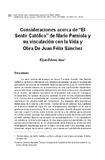Mostrar el registro sencillo del ítem
Consideraciones acerca de el sentir católico de Mario Perniola y su vinculación con la vida y obra de Juan Félix Sánchez
| dc.rights.license | http://creativecommons.org/licenses/by-nc-sa/3.0/ve/ | |
| dc.contributor.author | Eljuri Febres, Aixa | |
| dc.date.accessioned | 2015-04-10T13:55:31Z | |
| dc.date.available | 2015-04-10T13:55:31Z | |
| dc.date.issued | 2013-08 | |
| dc.identifier.uri | http://www.saber.ula.ve/handle/123456789/40079 | |
| dc.description.abstract | La tesis central del ensayo de Mario Perniola titulado: Del Sentire Cattólico, La forma culturale de una religione universale,1 es que lo esencial del catolicismo no está en un contenido doctrinal específico, sino en una forma de sentir, un método basado en la experiencia de una “participación imparticipe” que permite tanto la adquisición del equilibrio individual como actuar eficazmente en el mundo. Tal método encuentra su formulación más clara en Francesco Guicciardini y en Ignacio de Loyola, quienes vivieron en una edad precedente a la ruptura con el protestantismo, cuando podían nutrir todavía el profundo sentimiento de universalidad del cristianismo. Sin embargo esta experiencia distanciada de sí mismo y del mundo, núcleo del sentir católico, fue sustituida en la primera mitad del siglo XIX por el dogmatismo ideológico en el cual la iglesia se encerró para hacer frente a sus enemigos. A partir de aquel momento han sido -según Perniola- sobre todo los escritores y los artistas, generalmente no confesionales, quienes han interpretado y desarrollado de forma autónoma el sentir católico. Esta forma de sentir se caracterizaría por: 1) Un catolicismo sin ortodoxia; 2) Una fe sin dogma; 3) Una esperanza sin superstición; 4) Una caridad sin envilecimiento; 5) Un pensamiento de la Diferencia. En la presente investigación mostramos que en la vida y obra de Juan Félix Sánchez, están presentes rasgos de un sentir católico, aun cuando se trata definitivamente de un artista confesional. Es evidente en su actividad artística la experiencia de la diferencia del mundo, asimismo hemos encontrado acercamientos en relación al pensamiento de la diferencia entre Loyola y Juan Félix. | es_VE |
| dc.language.iso | es | es_VE |
| dc.rights | info:eu-repo/semantics/openAccess | |
| dc.subject | Estética católica | es_VE |
| dc.subject | Arquitectura religiosa | es_VE |
| dc.subject | Pensamiento de la diferencia | es_VE |
| dc.title | Consideraciones acerca de el sentir católico de Mario Perniola y su vinculación con la vida y obra de Juan Félix Sánchez | es_VE |
| dc.title.alternative | Considerations about the feeling catholic Mario Perniola and its relationship with life and work of Juan Felix Sanchez | es_VE |
| dc.type | info:eu-repo/semantics/article | |
| dc.description.abstract1 | The central thesis of Mario Perniola essay entitled: Del Sentire Cattólico, la forma culturale de una religione universale, is that the essence of Catholicism is not in a specific doctrinal content, but in a way of feeling, a method based on the experience of a “share imparticipe” that allows the acquisition of balance both individually and act effectively in the world. This method finds its clearest formulation in Francesco Guicciardini and Ignatius of Loyola, who lived in an age preceding the break with Protestantism, when they could still nourish deep sense of universality of Christianity. However, this experience distanced himself and the world, the core of Catholic feeling was replaced in the first half of the nineteenth century ideological dogmatism in which the church is locked to deal with his enemies. From that moment have been, according Perniola, especially writers and artists, usually non-denominational, who have interpreted and developed autonomously Catholic sentiment. This way they feel would be characterized by: 1) A non orthodox Catholicism, 2) A faith without dogma; 3) hope without superstition; 4) A charity without degradation; 5) Thinking of Difference. In this study we show that in the life and work of Juan Felix Sanchez, present features of a Catholic feel, even though it is definitely an artist confessional. It is evident in his artistic activity experience the difference in the world, we also found approaches in relation to the thought of the difference between Loyola and Juan Felix. | es_VE |
| dc.description.colacion | 350-376 | es_VE |
| dc.description.email | aixaeljuri@ula.ve | es_VE |
| dc.description.frecuencia | trimestral | |
| dc.publisher.pais | Venezuela | es_VE |
| dc.subject.centroinvestigacion | Centro de Investigaciones en Ciencias Humanas (HUMANIC) | |
| dc.subject.facultad | Facultad de Humanidades y Educación | es_VE |
| dc.subject.institucion | Universidad de los Andes | es_VE |
| dc.subject.keywords | Aesthetics catholic | es_VE |
| dc.subject.keywords | Religious architecture | es_VE |
| dc.subject.keywords | Thinking of difference | es_VE |
| dc.subject.publicacionelectronica | Revista Fermentum | |
| dc.subject.seccion | Revista Fermentum: Editorial | es_VE |
| dc.subject.thematiccategory | Artes y Humanidades | es_VE |
| dc.subject.tipo | Revistas | es_VE |
| dc.type.media | Texto | es_VE |
Ficheros en el ítem
Este ítem aparece en la(s) siguiente(s) colección(ones)
-
Fermentum - Año 023 - Nº 68
agosto - diciembre 2013


